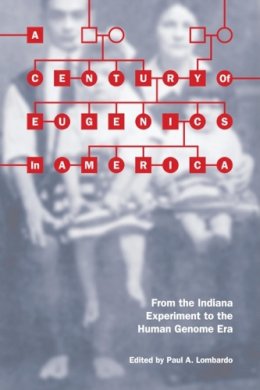Paul A. Lombardo is Professor of Law at Georgia State University College of Law. He is author of Three Generations, No Imbeciles: Eugenics, the Supreme Court, and Buck v. Bell.
"As a nation with lofty ambitions, the United States has had a mixed relationship with eugenics. The first country to prohibit procreation by criminals and 'idiots' — in the state of Indiana in 1907 — today it embraces the Human Genome Project and the possibility of genetic enhancement. Law professor Paul Lombardo examines US legislation and attitudes to human selection in the past century, and the likelihood of such pressures arising again in modern genetics."—Nature, Vol. 469, January 12 2011 "In 1907, Indiana became the first state to pass a sterilization law. The last sterilization of an Indiana resident took place in 1971. Thus, the state has the dubious honor of being the first and one of the last states to sterilize a US citizen forcibly in hopes of protecting the fit from the unfit. The subjects of this essay collection include the definitions of those two terms, the legality of the process, the culture that would rationalize such a procedure, and the uneasiness engendered in many persons by the neo-eugenic language used by supporters of the Human Genome Project. A noted historian of the eugenics movement, editor Lombardo (Georgia State Univ.) has divided this book into essays that focus upon the history of sterilization in Indiana; additional state studies, including California, which sterilized more persons than any other state; and two chapters that examine sterilization as portrayed in popular culture. The final two essays are perhaps the most important, as they look at the implications for contemporary medicine and law regarding the renewed interest in 'better breeding' as a result of the Human Genome Project. Summing Up: Recommended. All academic levels/libraries. —Choice"—D. O. Cullen, Collin College, October 2011 "Valuable and welcome . . ."—BULLETIN HISTORY OF MEDICINE "[T]here are indeed valuable lessons to be learnt from . . . this book; the editor was probably wise to confine its scope to the narrower brief of American compulsory sterilisation . . . .Nov. 2011"—Human Genetics "Valuable and welcome . . .Vol. 85.4 Winter 2011"—BULLETIN HISTORY OF MEDICINE "A noted historian of the eugenics movement, editor Lombardo has divided this book into essays . . . The final two essays are perhaps the most important, as they look at the implications for contemporary medicine and law regarding the renewed interest in 'better breeding' as a result of the Human Genome Project. . . . Recommended.October 2011"—Choice "Paul Lombardo has assembled a compelling argument for close monitoring of modern genetic policies in the Human Genome Era . . . It is essential reading. April 20, 2011"—The Internet Review of Books "A groundbreaking achievement in the historiography of American eugenics."—Joanne Woiak, University of Washington "A most important volume and a significant contribution to the field, [the book] will serve both experts and the general public in parsing the difficult issues raised by a transformed eugenics in the 21st century."—Steven Selden, University of Maryland

